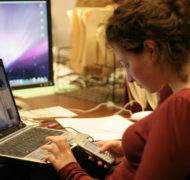Multitasking Fast
Blog / Produced by The High Calling
I spend most of my days multitasking—simultaneously listening to the radio, checking email, answering phone calls and drop-by questions from coworkers, while also moving in and out of various software programs running queries, researching discrepancies, and tabulating results. It all appears very busy and productive, but at the end of the day, I often am not even really sure what I accomplished.
If my life is any indication, multitasking doesn't seem to work.
John Medina, a molecular biologist, suggests the same thing. He says that multitasking actually impairs one's cognitive ability similarly to drunkenness, particularly when the multitasking happens behind the wheel of a vehicle (which is the impetus behind many local bans on texting and driving).
Consultant Mark McGuinness cites Medina's work in his online article, "Why Multitasking Doesn't Work," going even further in his analysis to claim that multitasking doesn't even really exist. As McGuinnes summarizes, ”There's no such thing as multitasking. Just task switching—or at best, background tasking, in which one activity consumes our attention while we're mindlessly performing another."
If my work suffers from too much multitasking, though, how much more my relationships? My life is "literally" wired for accomplishing stuff. With all of my appliances, electronics, and mobile devices, I can be getting so much done that I never interact with an actual person. Even when I am with another person, it's all too easy to try to stay productive by answering texts and email on my smart phone, making online orders, or updating my calendar.
I've even found myself task switching through my time with Jesus lately: dinner on the table, Bible on my lap, iPhone in hand, and the television on in the background.
The opposite of multitasking is not just "single" tasking, however. It's about putting all my concentration on one thing, focused tasking, if you will. A lot of times, it means really committing my attention to another person. Often, it is putting my whole self into the task at hand. Mostly, it's about being present in the moment.
I'm not sure that I can completely eliminate task switching from my life, but I can work on being present. In fact, for Lent this year, rather than giving up chocolate or television, I gave up multitasking. From Ash Wednesday to Good Friday, I tried to do only one thing at a time and be only one place at a time. In being present, I hoped to encounter the presence of Jesus in a fresh way.
Unavoidable Multitasking
When I set out to make my personal rules for the multitask fast, I initially was stumped about what to do with prayer. In fact, while I was doing dishes that first evening, I found it difficult not to give my thoughts over to Jesus in prayer at the same time since there were no other distractions around me.
I realized then that to be obedient to Jesus I actually must multitask most of the time; that is, if I consider praying while doing other things "multitasking."
I had never thought of prayer in this way before. I was amazed to consider how much prayer time I had been "wasting" by having too much noise around me during my usual multitasking.
Unplugged Stillness
During my couple of weeks of the fast, I also wasn't sure how to handle the quiet that followed me around as the radio sat silent, the TV dark, the computer in sleep mode. I did pray more, as I mentioned, but I was also left alone with my thoughts more.
By the fourth and fifth weeks, however, I came to value the quiet. My dad had unexpected heart surgery during that time, and work had become very hectic. The quiet of my fast became a respite from the chaotic circumstances around me.
Unexpected Loneliness
Though I came to cherish the quiet, however, eliminating multitasking from my life often left me feeling lonely. While I had more time for prayer and reflection, I also had less time to interact with other people.
Since I usually made most of my phone calls to friends and family while doing other things—commuting, walking my dog, preparing dinner—something had to go. And since I still needed to get to work, care for my dog, and eat, the thing that suffered was communicating with others.
When I did make time for a phone conversation or a cup of coffee with a friend, however, I could really focus on the relationship. Because I didn't have two other balls in the air at the same time, I could listen closely to the person on the other end of the line or sitting across the table.
Task switching may be an inherent part of our fast-paced, plugged-in world, but we can still make time each week, or even each day, to slow down, reduce the volume, and focus on doing just one thing.
Questions for reflection or small group study:
- What tasks in your daily work do you think could benefit from some focused attention?
- Do you think task switching has affected any of your relationships at work or home?
- Spend some time looking through the pictures from High Calling Focus. What do the simplistic subjects of these photos teach you about being present in the moment?
- To learn more about John Medina, read our interview with him: From Curiosity to Jesus.




